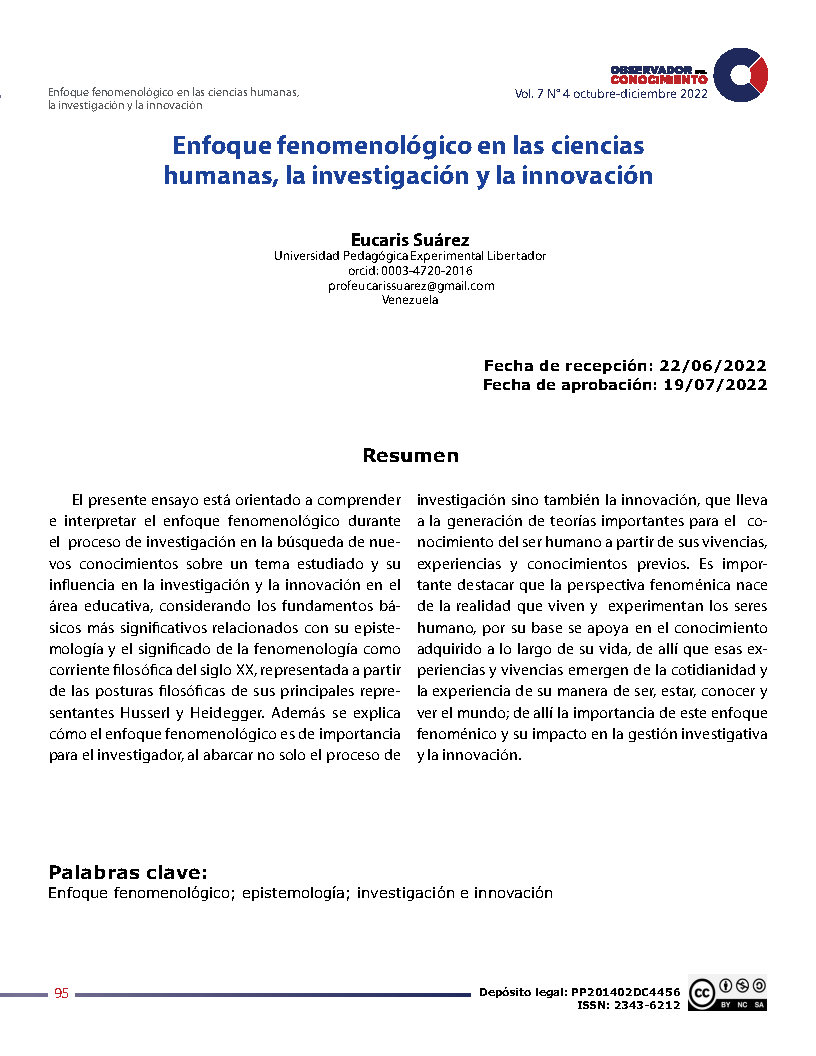Phenomenological approach in the human sciences, research and innovation
Keywords:
Phenomenological approach, epistemology, research and innovationAbstract
This essay is aimed at understanding and interpreting the phenomenological approach during the research process in the search for new knowledge on a subject studied and its influence on research and innovation in the educational area, considering the most significant basic foundations related to its epistemology and the meaning of phenomenology as a philosophical current of the 20th century, represented from the philosophical positions of its main representatives Husserl and Heidegger. In addition, it is explained how the phenomenological approach is important for the researcher, as it encompasses not only the research process but also innovation, which leads to the generation of important theories for the knowledge of the human being from their experiences, experiences and previous knowledge. It is important to highlight that the phenomenal perspective is born from the reality that human beings live and experience, for its base it is based on the knowledge acquired throughout their lives, hence these experiences and experiences emerge from everyday life and the experience of their way of being, being, knowing and seeing the world; hence the importance of this phenomenal approach and its impact on research management and innovation.
Downloads
References
Bustamante, S. y Pérez, I. (2005). Ciencia, Tecnología y formación del talento humano: una respuesta a la realidad multicultural. Revista Educare, Vol. 9. No 2 (Extraordinario) Junio. pp. 223-237. Universidad Pedagógica Experimental Libertador-IPB, Barquisimeto. Lara, Venezuela.
Cazau, P. (2011). Evolución de las relaciones entre la epistemología y la metodología de la investigación. Revista Paradigmas. Ene.-jun., 2011, Vol. 3, No. 1, 109-126.
De los Reyes, H. Rojano, Á. y Araújo, L. (2019). La fenomenología: un método multidisciplinario en el estudio de las ciencias sociales. Pensamiento & Gestión, (47), 203-223. https://doi.org/10.14482/pege.47.7008
Díaz, V. (1999). Desarrollar la profesionalidad. Currículo, investigación y enseñanza. Universidad Pedagógica Experimental Libertador UPEL IMPM, Núcleo Táchira, San Cristóbal, Venezuela.
Editorial, Etecé. (s/f). Enciclopedia Concepto. Recuperado en: https://concepto.de/nacion-2/. Última edición: 4 de septiembre de 2020. Consultado: 21 de octubre de 20222.
Fernández, I. (2007). Diccionario de investigación. Una comprensión holística. Segunda edición. Sypal. Caracas: Quirón.
Forner, A. y Latorre, A. (1996). Diccionario terminológico de investigación educativa y psicopedagógica. Barcelona: EUB.
Giorgi, A. (1984). Hacia un nuevo paradigma para la psicología. Revista Estudios en ciencias sociales. Vol. XXII. Universidad de West Georgia.
Heidegger, M. (1996). El Ser y el Tiempo. (José, G. Trad.) Barcelona: Fondo de Cultura Económica.
Leal, J. (2011). La autonomía del sujeto investigador y la metodología de la investigación. Mérida, Venezuela: Universidad de Los Andes.
Marcheto, M. (2006). El modelo teórico interpretativo del proceso de investigación desde un enfoque innovador en el IUTAEB. Tesis Doctoral. Universidad Santa María. Caracas. Venezuela.
Martínez, A; Escalona, L; Santiesteban, Y. y Pérez, J. (2020). Los procesos de innovación educativa. Resultados en el Centro Universitario de Guisa. Revista Atlante: Cuadernos de Educación y Desarrollo. (Febrero 2020).
Martínez, M. (2006). Comportamiento humano. Nuevos métodos de investigación. México: Trillas.
Piñero, M. y Ribera, E. (2012). Investigación cualitativa: Orientaciones procedimentales. Subdirección de investigación y postgrado. Universidad Pedagógica Experimental Libertador. Barquisimeto. Venezuela.
Ray. M. (1994). La riqueza de la fenomenología: preocupaciones filosóficas, teóricas y metodológicas. Londres: Sage.
Rojas, A. y Rojas, B. (2009). Perspectivas Teóricas y Epistemológicas de la investigación cualitativa en educación: ideas básicas para su comprensión. Universidad Pedagógica Experimental Libertador. UPEL-IPB.
Sandín, M. (2003). Investigación educativa en educación. Fundamentos y tradiciones. Madrid: Mc Graw Hill.








